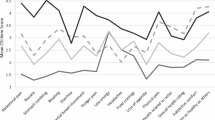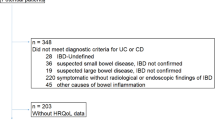Abstract
Background
The relative effects of clinical and psychosocial variables on outcome in celiac disease (CD) has not previously been reported. In adult patients with (CD), we studied the relationships among demographics, psychosocial factors, and disease activity with health-related quality of life (HRQOL), health care utilization, and symptoms.
Methods
Among 101 adults newly referred to a tertiary care center with biopsy-proven CD we assessed: (a) demographic factors and diet status; (b) disease measures (Marsh score, tissue transglutaminase antibody (tTG) level, weight change and additional blood studies); and (c) Psychosocial status (psychological distress, life stress, abuse history, and coping). Multivariate analyses were performed to predict HRQOL, daily function, self-reported health, number of physician visits, and GI symptoms (pain and diarrhea).
Results
Impaired HRQOL and daily function was associated with psychological distress and poorer coping. Self-report of poorer health was associated with poorer coping, longer symptom duration, lower education, and greater weight loss. More physician visits were associated with poorer coping, abnormal tTG levels, and milder Marsh classification. Greater pain scores were seen in those with higher psychological distress and greater weight loss. Finally, diarrhea was associated with greater psychological distress and poorer coping.
Conclusions
In patients presenting to a CD referral center, psychosocial factors more strongly affect health status and GI symptoms than disease measures.

Similar content being viewed by others
Abbreviations
- BMI:
-
Body mass index
- BSI:
-
Brief symptom inventory
- BSS:
-
Bristol stool scale
- CD:
-
Celiac disease
- CSQ:
-
Coping strategies questionnaire
- IBD:
-
Inflammatory bowel disease
- IBS:
-
Irritable bowel syndrome
- IBS-QOL:
-
Irritable bowel syndrome quality of life scale
- LES:
-
Life experiences survey
- PHQ:
-
Physician health questionnaire
- SIP:
-
Sickness impact profile
- tTG:
-
Tissue transglutaminase antibody
- VAS:
-
Visual analog scale
References
James SP. National Institutes of Health consensus development conference statement on celiac disease, June 28–30, 2004. Gastroenterology. 2005;128:S1–S9.
Marsh MN. Gluten, major histocompatibility complex, and the small intestine. A molecular and immunobiologic approach to the spectrum of gluten sensitivity (‘celiac sprue’). Gastroenterology. 1992;102:330–354.
Green PHR. The many faces of celiac disease: clinical presentation of celiac disease in the adult population. Gastroenterology. 2005;128:S74–S78.
Brar P, Kwon GY, Egbuna II, et al. Lack of correlation of degree of villous atrophy with severity of clinical presentation of coeliac disease. Dig Liver Dis. 2007;39:26–29.
Mulder C, Rostami K, Marsh MN. When is a coeliac a coeliac? Gut. 1998;42:594–598.
Drossman DA, Patrick DL, Mitchell CM, Zagami EA, Appelbaum MI. Health related quality of life in inflammatory bowel disease: functional status and patient worries and concerns. Dig Dis Sci. 1989;34:1379–1386.
Levy RL, Olden KW, Naliboff BD, et al. Psychosocial aspects of the functional gastrointestinal disorders. Gastroenterology. 2006;130:1447–1458.
Drossman DA. Presidential address: gastrointestinal illness and biopsychosocial model. Psychosom Med. 1998;60:258–267.
Drossman DA, Toner BB, Whitehead WE, et al. Cognitive-behavioral therapy verses education and desipramine verses placebo for moderate to severe functional bowel disorders. Gastroenterology. 2003;125:19–31.
Donaldson MR, Firth SD, Wimpee H, et al. Correlation of duodenal histology with tissue transglutaminase and endomysial antibody levels in pediatric celiac disease. Clin Gastroenterol Hepatol. 2007;5:567–573.
Tursi A, Brandimarte G, Giorgetti GM. Prevalence of antitissue transglutaminase antibodies in different degrees of intestinal damage in celiac disease. J Clin Gastroenterol. 2003;36:219–221.
Lewis SJ, Heaton KW. Stool form scale as a useful guide to intestinal transit time. Scand J Gastroenterol. 1997;32:920–924.
Derogatis LR. SCL-90-R: Administration, Scoring, and Procedures Manual II—For the R(evised) Version. Towson: Clinical Psychometric Research; 1983.
Kroenke K. Studying symptoms: sampling and measurement issues. Ann Intern Med. 2001;134(2):844–853.
Rosenstiel AK, Keefe FJ. The use of coping strategies in chronic low back pain patients: relationship to patient characteristics and current adjustment. Pain. 1983;17:33–44.
Sarason IG, Johnson JH, Siegel JM. Assessing the impact of life changes: development of the life experiences survey. J Consult Clin Psychol. 1978;46:932–946.
Leserman J, Li Z, Drossman DA, Toomey TC, Nachman G, Glogau L. Impact of sexual and physical abuse dimensions on health status: development of an abuse severity measure. Psychosom Med. 1997;59:152–160.
Bergner M, Bobbitt RA, Carter WB. The sickness impact profile: development and final revision of a health status measure. Med Care. 1981;19:787–805.
Drossman D, Morris CB, Hu Y, et al. Characterization of health related quality of life (HRQOL) for patients with functional bowel disorder (FBD) and its response to treatment. Am J Gastroenterol. 2007;102:1442–1453.
Drossman DA, Patrick DL, Whitehead WE, et al. Further validation of the IBS-QOL: a disease specific quality of life questionnaire. Am J Gastoenterol. 2000;95:999–1007.
Drossman DA, Toner BB, Whitehead WE, Diamant NE, Dalton CB, Emmott S, Proffitt V, Akman D, Frusciante K, Meyer K, Blackman C, Hu Y, Jia H, Li Z, Morris CB, Koch GG, Bangdiwala S. A multi-center randomized trial of cognitive-behavioral treatment (cbt) vs. education (edu) in moderate to severe functional bowel disorder (fbd). 124 ed. A-530; 2003.
Longstreth GF, Thompson WG, Chey WD, Houghton LA, Mearin F, Spiller RC. Functional bowel disorders. In: Drossman DA, Corazziari E, Delvaux M, Spiller RC, Talley NJ, Thompson WG, Whitehead WE, eds. Rome III: The Functional Gastrointestinal Disorders. 3rd ed. McLean, VA: Degnon Associates, Inc.; 2006:487–555.
Eisenberg L. Disease and illness. Distinctions between professional and popular ideas of sickness. Cult Med Psychiatry. 1977;1:9–23.
Engel GL. The need for a new medical model: a challenge for biomedicine. Science. 1977;196:129–136.
Murray JA, Rubio-Tapia A, Van Dyke CT, et al. Mucosal atrophy in celiac disease: extent of involvement, correlation with clinical presentation, and response to treatment. Clin Gastroenterol Hepatol. 2008;6:186–193.
Lo W, Sano K, Lebwohl B, Diamond B, Green PH. Changing presentation of adult celiac disease. Dig Dis Sci. 2003;48:395–398.
Rampertab SD, Pooran N, Brar P, Singh P, Green PH. Trends in the presentation of celiac disease. Am J Med. 2006;119:355.e14.
Leffler DA, Dennis M, Hyett B, Kelly E, Schuppan D, Kelly CP. Etiologies and predictors of diagnosis in nonresponsive celiac disease. Clin Gastroenterol Hepatol. 2007;5:445–450.
Coleman NS, Foley S, Dunlop SP, et al. Abnormalities of serotonin metabolism and their relation to symptoms in untreated celiac disease. Clin Gastroenterol Hepatol. 2006;4:874–881.
Gwee KA, Graham JC, McKendrick MW, et al. Psychometric scores and persistence of irritable bowel after infectious diarrhoea [see comments]. Lancet. 1996;347:150–153.
Simren M, Axelsson J, Gillberg R, Abrahamsson H, Svedlund J, Bjornsson ES. Quality of life in inflammatory bowel disease in remission: the impact of IBS-like symptoms and associated psychological factors. Am J Gastroenterol. 2002;97:389–396.
Hauser W, Musial F, Caspary WF, Stein J, Stallmach A. Predictors of irritable bowel-type symptoms and healthcare-seeking behavior among adults with celiac disease. Psychosom Med. 2007;69:370–376.
O’Leary C, Wieneke P, Buckley S, et al. Celiac disease and irritable bowel-type symptoms. Am J Gastroenterol. 2002;97:1463–1467.
Usai P, Manca R, Cuomo R, Lai MA, Boi MF. Effect of gluten-free diet and co-morbidity of irritable bowel syndrome-type symptoms on health-related quality of life in adult coeliac patients. Dig Liver Dis. 2007;39:824–828.
Fera T, Cascio B, Angelini G, Martini S, Guidetti CS. Affective disorders and quality of life in adult coeliac disease patients on a gluten-free diet. Eur J Gastroenterol Hepatol. 2003;15:1287–1292.
Addolorato G, Leggio L, D’Angelo C, et al. Affective and psychiatric disorders in celiac disease. Dig Dis. 2008;26:140–148.
Ciacci C, D’Agate C, De Rosa A, et al. Self-rated quality of life in celiac disease. Dig Dis Sci. 2003;48:2216–2220.
de Rosa A, Troncone A, Vacca M, Ciacci C. Characteristics and quality of illness behavior in celiac disease. Psychosomatics. 2004;45:336–342.
Drossman DA. A biopsychosocial understanding of gastrointestinal illness and disease. In: Feldman M, Scharschmidt B, Sleisenger MH, eds. Sleisenger and Fordtrans’s Gastrointestinal Disease. 7th ed. Philadelphia: W.B. Saunders; 2002:2373–2385.
Sullivan MJ, Thorn B, Haythornthwaite JA, et al. Theoretical perspectives on the relation between catastrophizing and pain. Clin J Pain. 2001;17:52–64.
Drossman DA, Li Z, Leserman J, Keefe FJ, Hu YJ, Toomey TC. Effects of coping on health outcome among female patients with gastrointestinal disorders. Psychosom Med. 2000;62:309–317.
Hallert C, Granno C, Hulten S, et al. Living with coeliac disease: controlled study of the burden of illness. Scand J Gastroenterol. 2002;37:39–42.
Hopper AD, Cross SS, Sanders DS. Patchy villous atrophy in adult patients with suspected gluten-sensitive enteropathy: is a multiple duodenal biopsy strategy appropriate? Endoscopy. 2008;40:219–224.
Addolorato G, Stefanini GF, Capristo E, Caputo F, Gasbarrini A, Gasbarrini G. Anxiety and depression in adult untreated celiac subjects and in patients affected by inflammatory bowel disease: a personality “trait” or a reactive illness? Hepatogastroenterology. 1996;43:1513–1517.
Addolorato G, Capristo E, Ghittoni G, et al. Anxiety but not depression decreases in coeliac patients after one-year gluten-free diet: a longitudinal study. Scand J Gastroenterol. 2001;36:502–506.
Zarkadas M, Cranney A, Case S, et al. The impact of a gluten-free diet on adults with coeliac disease: results of a national survey. J Hum Nutr Diet. 2006;19:41–49.
Grover M, Drossman DA. Psychotropic agents in functional gastrointestinal disorders. Curr Opin Pharmacol. 2008;8:715–723.
Acknowledgments
This study was supported in part by a grant from the NIH Gastrointestinal Biopsychosocial Research Center R24DK067674 and T32 DK 007634.
Author information
Authors and Affiliations
Corresponding author
Rights and permissions
About this article
Cite this article
Dorn, S.D., Hernandez, L., Minaya, M.T. et al. Psychosocial Factors Are More Important Than Disease Activity in Determining Gastrointestinal Symptoms and Health Status in Adults at a Celiac Disease Referral Center. Dig Dis Sci 55, 3154–3163 (2010). https://doi.org/10.1007/s10620-010-1342-y
Received:
Accepted:
Published:
Issue Date:
DOI: https://doi.org/10.1007/s10620-010-1342-y




